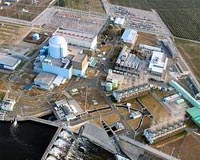 |
Dubai, United Arab Emirates (UPI) Nov 20, 2009 The oil-rich United Arab Emirates is expected to award a contract for the Gulf's first nuclear power plant this year, amid concerns this could be the trigger for a new regional arms race with Iran. Saudi Arabia is reported to be pushing ahead with its own nuclear plans, particularly as hopes of an accommodation between the United States and Iran over its controversial nuclear program appear to be dimming. The United Arab Emirates and Saudi Arabia have signed nuclear cooperation deals with the United States. Kuwait is considering developing nuclear power with French help and in June Egypt signed a deal with Russia to build the first of four planned nuclear power stations. All this activity, which extends to Turkey, Jordan and other regional states, is causing alarm at the prospect of nuclear proliferation in a volatile, strategic region. The Middle East is gripped by mounting tension over the confrontation between Shiite Iran and its Sunni rivals, not to mention Israel and the United States, over Tehran's alleged drive to acquire nuclear weapons. Shiite Iran claims its program is aimed at boosting power generation. But the Sunni regimes in the Gulf fear that Iran's intention is to become the region's paramount power and dominate them. Thus, these states' move to acquire nuclear technology has generated suspicions that they may be seeking to develop nuclear weapons to counter suspected Iranian expansionist ambitions. "It is possible that the genuine desire of Gulf states to engage in civil peaceful nuclear power could possibly tip the region into a nuclear arms race, especially if state intentions are misunderstood," the Chatham House think tank in London said in a report published Nov. 10. "Risks from nuclear proliferation cannot be eliminated entirely" from the United Arab Emirates' program, analyst Ian Jackson wrote in the paper entitled "Nuclear Energy and Proliferation Risks: Myths and Realities in the Persian Gulf." The United Arab Emirates, the fourth ranked producer in the Organization of Petroleum Exporting Counties, is turning to nuclear power because its oil reserves are steadily declining and it does not produce enough natural gas to meet demand amid an economic boom that has strained domestic power grids. The Gulf state has an agreement with the United States that precludes enrichment of uranium, the key step toward developing nuclear weapons, on United Arab Emirates soil. On Oct. 5, the United Arab Emirates' president, Sheik Khalifa bin Zayed al-Nahyan, signed into law a regulatory framework for building "a peaceful nuclear energy sector." It is in line with the regulations of United Nations' nuclear watchdog, the International Atomic Energy Agency, which prohibit uranium enrichment or reprocessing spent nuclear rods, another path toward developing nuclear arms. A statement issued by the United Arab Emirates Embassy in Washington said that makes it "impossible for any future (United Arab Emirates) nuclear sector to produce weapons-usable nuclear material, thus severing the principal link between civil nuclear energy and nuclear weapons development." However, Jackson stressed, the Gulf states have an abundance of funds to obtain the most advanced nuclear technology and "it is unlikely" that this can be kept separate from the technology that will produce nuclear arms. "The United Arab Emirates would probably gain sufficient domestic capability to weaponize its civil nuclear energy program within 10 years," he wrote. Still, in May U.S. President Barack Obama approved plans to assist the United Arab Emirates develop nuclear power to meet growing demand. These declare that the United Arab Emirates must import fuel for its reactors rather than produce it itself. Even so, U.S. support for the United Arab Emirates on this issue is viewed with grave misgivings by nonproliferation organizations. They view the United Arab Emirates and its strong economic ties with Iran, not to mention the links between prominent figures there and al-Qaida, with deep suspicion. Two of the 9/11 suicide bombers were from the United Arab Emirates. The U.S. administration has said that the United Arab Emirates has been helpful in combating al-Qaida and can be trusted. As if to prove that point, authorities in the United Arab Emirates were reported to have broken up a terrorist plot to blow up buildings in Dubai, the Emirates' financial center, in May -- about the time Obama approved plans to help the United Arab Emirates' nuclear program. Share This Article With Planet Earth
Related Links Nuclear Power News - Nuclear Science, Nuclear Technology Powering The World in the 21st Century at Energy-Daily.com
 Slovenia eyes second nuclear reactor by 2025: minister
Slovenia eyes second nuclear reactor by 2025: ministerLjubljana (AFP) Nov 20, 2009 Slovenia plans to build a second reactor at its nuclear power plant in Krsko between 2020 and 2025, Economy Minister Matej Lahovnik said here Friday. "The second reactor at Krsko will be built between 2020 and 2025," Lahovnik told a news conference. "I'm in favour of a second reactor since the nuclear option is very attractive and necessary for Slovenia," he said. The Slovenian ... read more |
|
| The content herein, unless otherwise known to be public domain, are Copyright 1995-2009 - SpaceDaily. AFP and UPI Wire Stories are copyright Agence France-Presse and United Press International. ESA Portal Reports are copyright European Space Agency. All NASA sourced material is public domain. Additional copyrights may apply in whole or part to other bona fide parties. Advertising does not imply endorsement,agreement or approval of any opinions, statements or information provided by SpaceDaily on any Web page published or hosted by SpaceDaily. Privacy Statement |